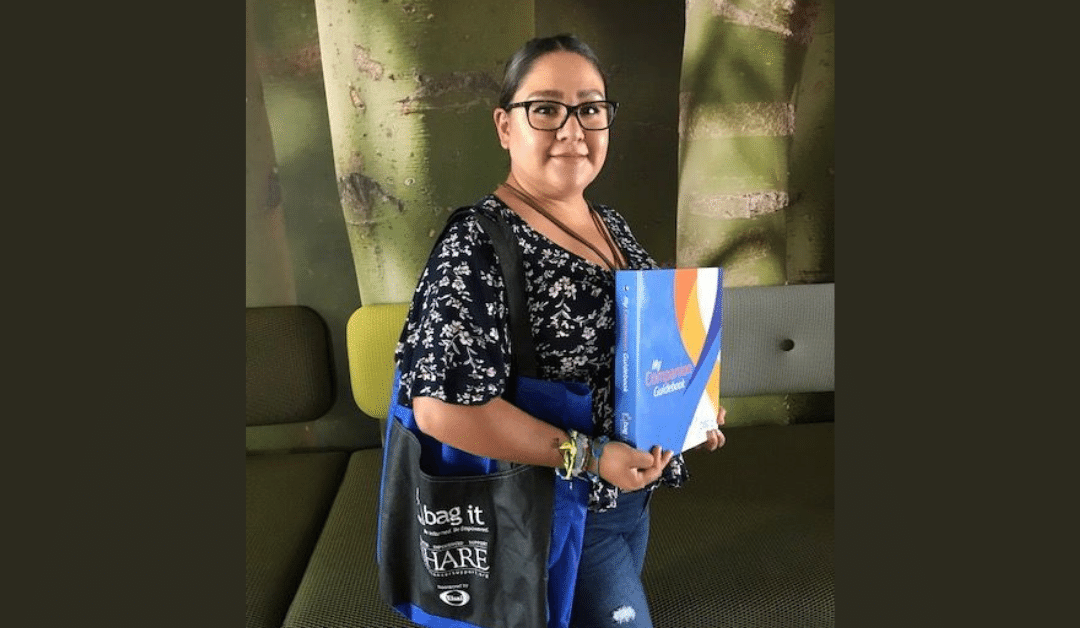
by Bag It Team | Aug 11, 2021 | Educational Articles
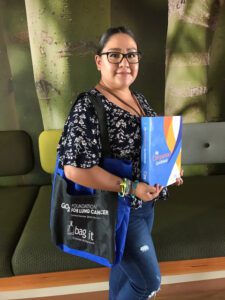 August 1st is World Lung Cancer Day, a day to raise awareness about lung health and how to prevent lung cancer.
August 1st is World Lung Cancer Day, a day to raise awareness about lung health and how to prevent lung cancer.
Did you know…
- About 25% of cancer deaths are from lung cancer – that’s more than colon, breast and prostate cancer deaths combined. (But the good news is that fewer Americans are smoking these days and new lung cancer treatments have been very effective in controlling some types of advanced disease.)
- Active cigarette smoking is by far the leading cause (about 80-90%) of lung cancer, but air pollution, secondhand smoke and other chemicals in the home and workplace, and family history, are also risk factors.
- While some experience symptoms related to the lungs, most people with lung cancer don’t have symptoms until the cancer is advanced.
- If you are at high risk*, an annual low-dose CT scan to screen for lung cancer may save your life. It can detect lung cancer earlier, when it is more treatable. Speak with your doctor about your personal health history and screening risks, as it is not recommended for everyone.
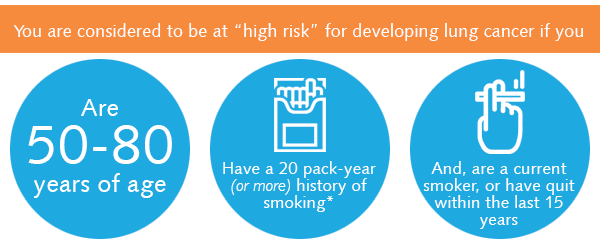
*(i.e. 1 pack a day for 20 years, 2 packs a day for 10 years, etc.)
Click here to order a lung cancer-specific or standard Bag it bag for yourself or as a gift for someone else. (available in English and Spanish)
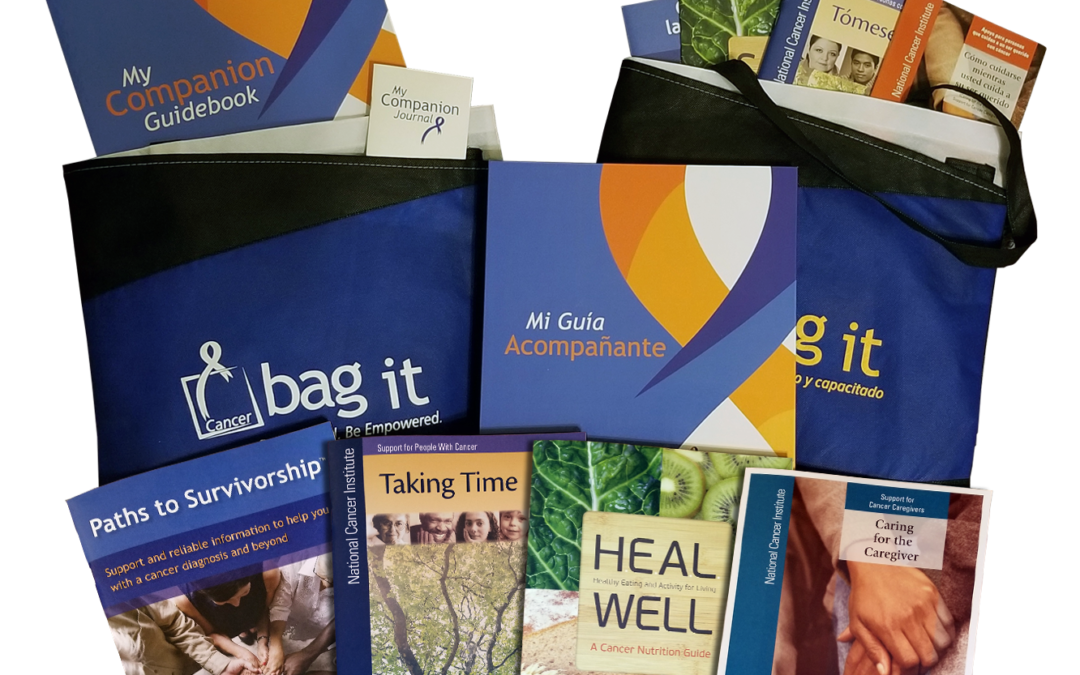
by Bag It Team | Feb 2, 2021 | Events
See how we impact the cancer community
Tune in virtually from the comfort of your home to hear Bag It updates!
- The faces behind Bag It
- Achievements and highlights from 2020
- Our goals for 2021
- Honoring supporters of Bag It
- All attendees will be entered into a drawing
This event occurred on Wednesday, February 24, 2021 but you can watch the recording on YouTube.

by Bag It Team | Nov 22, 2020 | Blog
Author: Jenna Frinfrock
 When Bag It announced the creation of the virtual Tribute Garden this past spring, I knew I needed to show my support by paying tribute not only to my dad, but also to his oncologist. In 2009 my father was diagnosed with advanced stage-four multiple myeloma. It was a terrifying diagnosis, followed by weeks of radiation treatments, months of chemotherapy medications, and a final successful stem cell transplant. Through it all, my dad had the good fortune of being a patient of Dr. Michael Boxer’s at Arizona Oncology. Not only did Dr. Boxer patiently answer all of our questions, he took the time to know us personally and encourage my dad throughout his treatments in the years following his original diagnosis.
When Bag It announced the creation of the virtual Tribute Garden this past spring, I knew I needed to show my support by paying tribute not only to my dad, but also to his oncologist. In 2009 my father was diagnosed with advanced stage-four multiple myeloma. It was a terrifying diagnosis, followed by weeks of radiation treatments, months of chemotherapy medications, and a final successful stem cell transplant. Through it all, my dad had the good fortune of being a patient of Dr. Michael Boxer’s at Arizona Oncology. Not only did Dr. Boxer patiently answer all of our questions, he took the time to know us personally and encourage my dad throughout his treatments in the years following his original diagnosis.
I truly cannot imagine what we would have done without the reassuring kindness and medical expertise that Dr. Boxer offered at every visit. Over the course of the last ten years, Dr. Boxer was instrumental in allowing my dad to beat back his cancer into remission and enjoy years of family gatherings. Because of Dr. Boxer’s care, my dad was able to attend family BBQs, celebrate holiday dinners and enjoy weekly zoo trips with his four grandchildren.
We all know that familiar adage, “it takes a village to raise a child.” I believe the same can be said when it comes to supporting someone with cancer. I will forever be grateful for the role that Dr. Boxer played in “our village” as he oversaw my dad’s care and treatment for ten years. It was a privilege for me to submit a tribute on his behalf when he retired from Arizona Oncology in June of 2020 after a very prestigious and inspiring career.
Check out the Virtual Tribute Garden here. It’s a place where you can recognize those touched by cancer.
It’s a wonderful time to show your thanks to a medical provider, caregiver or friend.
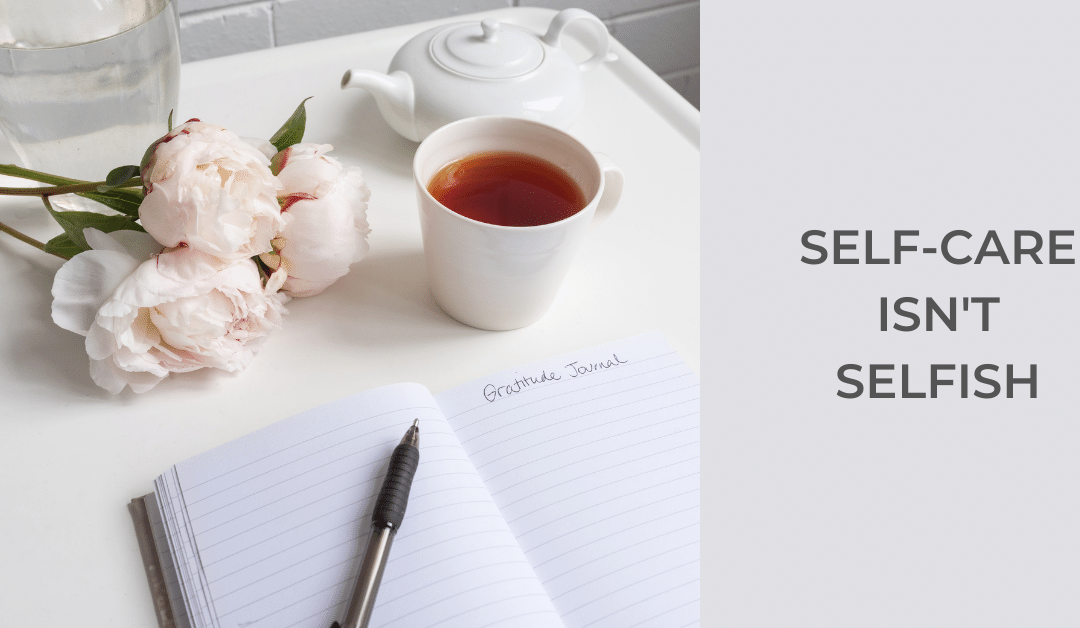
by Bag It Team | Oct 13, 2020 | Educational Articles
So, how are you?
 Let’s face it, months into life during a pandemic, everyone is struggling on some level. A Kaiser poll indicated that over 50% of Americans report that the pandemic and social-distancing are affecting their mental health. More people report that they are experiencing depression and anxiety. Emergency hotlines have noted over a 1000% increase in calls in comparison to 2019. If you need help, please get help.
Let’s face it, months into life during a pandemic, everyone is struggling on some level. A Kaiser poll indicated that over 50% of Americans report that the pandemic and social-distancing are affecting their mental health. More people report that they are experiencing depression and anxiety. Emergency hotlines have noted over a 1000% increase in calls in comparison to 2019. If you need help, please get help.
According to the Centers for Disease Control and Prevention (CDC), the COVID-19 pandemic can cause strong feelings of stress for adults and children, including:
- Fear & worry about your own health & the health of your loved ones
- Changes in sleep or eating patterns
- Difficulty sleeping or concentrating
- Worsening of chronic physical health problems
- Worsening of mental health conditions
If you’re experiencing any of these, there are ways to manage your symptoms and cope while maintaining physical distancing.
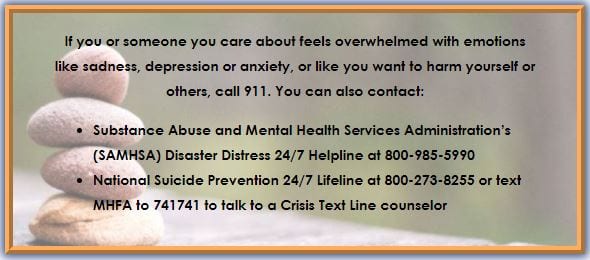
Continued from Newsletter…
 The National Alliance on Mental Illness (NAMI) offers several steps you can take to prevent this stressful time from impacting your mental health.
The National Alliance on Mental Illness (NAMI) offers several steps you can take to prevent this stressful time from impacting your mental health.
1) Maintain A Routine
If you’re not used to working from home, you may find the transition challenging. Creating a new teleworking routine will help you get into the right mindset, feel more productive and keep the boundaries between work and home from blurring. Bringing structure into your daily routine is key.
2) Take Reasonable Safety Precautions, But Don’t Go Overboard
Use only reliable sources of information, such as the CDC or Johns Hopkins University, to inform and make a plan for your health habits. Don’t let anxiety direct your behavior. Limit how much time you spend watching or listening to news that makes you upset.
3) Find Ways To “Get Going”
Now more than ever, you need to practice self-care. Practicing sound mental hygiene can help boost your psychological immunity. If you are prone to depression, you might be finding it harder to get out of bed in the morning, motivate yourself to accomplish chores or get started on a work project.
4) Try Not To Fixate On Sleep
The changes in your usual schedule, together with anxiety, can wreak havoc on your sleep. It might be helpful to listen to a guided meditation available on YouTube or one of the many meditation apps, such as 10% Happier, Headspace or the UCLA Center for Mindfulness
5) Stick To Consistent Meal Times
Eating only at meal times, rather than stress-snacking throughout the day, can also help you maintain your mental and physical wellbeing. Nourish yourself with healthy foods. However, it’s also perfectly fine to enjoy some comfort foods, like freshly baked cookies. Now is not the time to start a restrictive diet.
6) Follow Your Regular Mental Health Treatment Plan
Make sure you have an adequate supply of medication and take it as prescribed. Many mental health providers are now offering tele-therapy, either by phone or video, to comply with social distancing requirements. If you are dealing with cancer or a chronic illness, please keep connected to your healthcare provider by virtual visits or in person if safety permits (Bag It). Check with your insurer to see what virtual services they will cover.
7) Practice Mindfulness And Acceptance Techniques
 Whether you use meditation, yoga or prayer, focusing your attention on the present moment, rather than worrying about a catastrophic, uncertain future, can help you manage your distress. One good introductory resource, among many, is “Mindfulness: An Eight-Week Plan for Finding Peace in a Frantic World,” by Mark Williams and Danny Penman. The UCSD Center for Mindfulness also has free, guided meditations and useful information about the practice.
Whether you use meditation, yoga or prayer, focusing your attention on the present moment, rather than worrying about a catastrophic, uncertain future, can help you manage your distress. One good introductory resource, among many, is “Mindfulness: An Eight-Week Plan for Finding Peace in a Frantic World,” by Mark Williams and Danny Penman. The UCSD Center for Mindfulness also has free, guided meditations and useful information about the practice.
8) Be Kind To Yourself
A vast body of research conducted by the psychologist Kristin Neff and colleagues has shown the value of self-compassion for coping with emotional challenges and adversity. To ease feelings of isolation, acknowledge your struggle with kindness, rather than self-judgment, and recognize that millions of people world-wide are sharing your experience right now.
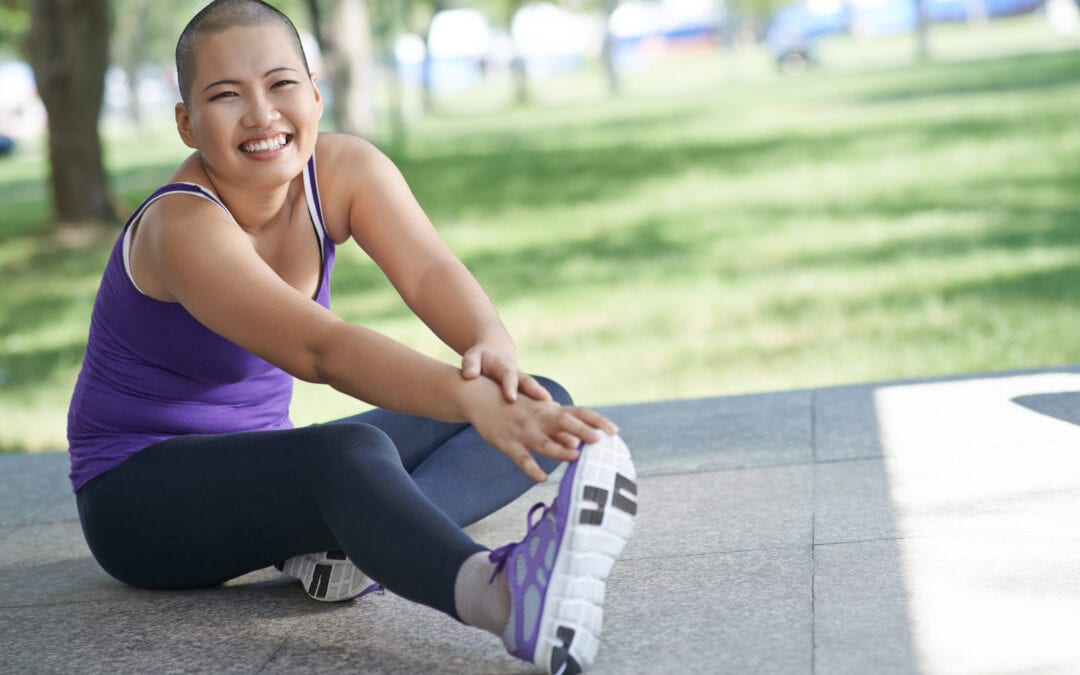
by Bag It Team | Sep 10, 2020 | Events
 We all know that staying physically active has many benefits for our health such as increased flexibility/balance/muscle strength, controlling weight, regulating blood pressure, digestion, improved mood, thinking, and sleep, just to name a few.
We all know that staying physically active has many benefits for our health such as increased flexibility/balance/muscle strength, controlling weight, regulating blood pressure, digestion, improved mood, thinking, and sleep, just to name a few.
But did you know that getting regular exercise may also:
- Help you live longer?
- Ironically, reduce fatigue and increase your energy?
- Reduce your risk for developing some types of cancers?
- Reduce the risk of certain cancers recurring?
- Ease some side effects of cancer treatment?
We have so many gadgets to inform us of what level of activity we are doing down to the minute on a daily basis. We even get “scolded” if we are not moving enough! When these gadgets first came out many thought that was exactly what they were – just gadgets. Today, many feel these are lifesaving instruments. Use the great technology out there to your advantage and commit to getting fit!
Getting Started
 Check in with your doctor for guidance on how to begin an exercise routine that’s right for you. If you have no health restrictions, gradually build up to 150 minutes of moderate physical activity per week (or 75 minutes of vigorous physical activity). Take it slow at first and if you miss a day just try again the next day.
Check in with your doctor for guidance on how to begin an exercise routine that’s right for you. If you have no health restrictions, gradually build up to 150 minutes of moderate physical activity per week (or 75 minutes of vigorous physical activity). Take it slow at first and if you miss a day just try again the next day.
Aim for a combo of cardio and strength training. (You can do strength training with or without weights)
Besides the obvious forms of exercise like walking, running, hiking, biking, swimming, aerobics, activities like dancing, gardening (digging, raking), household chores (vacuuming, mopping, washing windows, sorry!) or actively playing with children can be just as effective.
If you can’t do full 30-minute sessions some days, break it up into 2 or 3 sessions of 10 or 15 minutes each. It all counts!
Make it easy and fun! Change it up and do a variety of activities you enjoy by yourself or with a safely-distanced buddy.
Crankin’ up the tunes while you work will actually make you move faster and with more intensity.
Join us in our 2020 Get Moving for Bag It Fundraiser, Oct. 16-25, for a variety of activities to get you motivated.
Learn More and Register Here!

 August 1st is World Lung Cancer Day, a day to raise awareness about lung health and how to prevent lung cancer.
August 1st is World Lung Cancer Day, a day to raise awareness about lung health and how to prevent lung cancer.



 When Bag It announced the creation of the
When Bag It announced the creation of the 
 Let’s face it, months into life during a pandemic, everyone is struggling on some level. A Kaiser poll indicated that over 50% of Americans report that the pandemic and social-distancing are affecting their mental health. More people report that they are experiencing depression and anxiety. Emergency hotlines have noted over a 1000% increase in calls in comparison to 2019. If you need help, please get help.
Let’s face it, months into life during a pandemic, everyone is struggling on some level. A Kaiser poll indicated that over 50% of Americans report that the pandemic and social-distancing are affecting their mental health. More people report that they are experiencing depression and anxiety. Emergency hotlines have noted over a 1000% increase in calls in comparison to 2019. If you need help, please get help.
 The
The  Whether you use meditation, yoga or prayer, focusing your attention on the present moment, rather than worrying about a catastrophic, uncertain future, can help you manage your distress. One good introductory resource, among many, is “Mindfulness: An Eight-Week Plan for Finding Peace in a Frantic World,” by Mark Williams and Danny Penman. The
Whether you use meditation, yoga or prayer, focusing your attention on the present moment, rather than worrying about a catastrophic, uncertain future, can help you manage your distress. One good introductory resource, among many, is “Mindfulness: An Eight-Week Plan for Finding Peace in a Frantic World,” by Mark Williams and Danny Penman. The 
 We all know that staying physically active has many benefits for our health such as increased flexibility/balance/muscle strength, controlling weight, regulating blood pressure, digestion, improved mood, thinking, and sleep, just to name a few.
We all know that staying physically active has many benefits for our health such as increased flexibility/balance/muscle strength, controlling weight, regulating blood pressure, digestion, improved mood, thinking, and sleep, just to name a few. Check in with your doctor for guidance on how to begin an exercise routine that’s right for you. If you have no health restrictions, gradually build up to 150 minutes of moderate physical activity per week (or 75 minutes of vigorous physical activity). Take it slow at first and if you miss a day just try again the next day.
Check in with your doctor for guidance on how to begin an exercise routine that’s right for you. If you have no health restrictions, gradually build up to 150 minutes of moderate physical activity per week (or 75 minutes of vigorous physical activity). Take it slow at first and if you miss a day just try again the next day.
Recent Comments